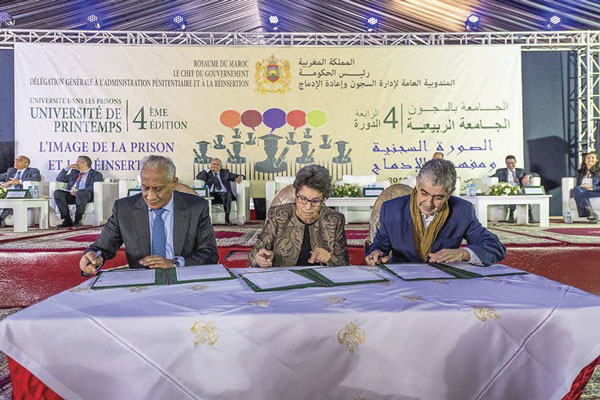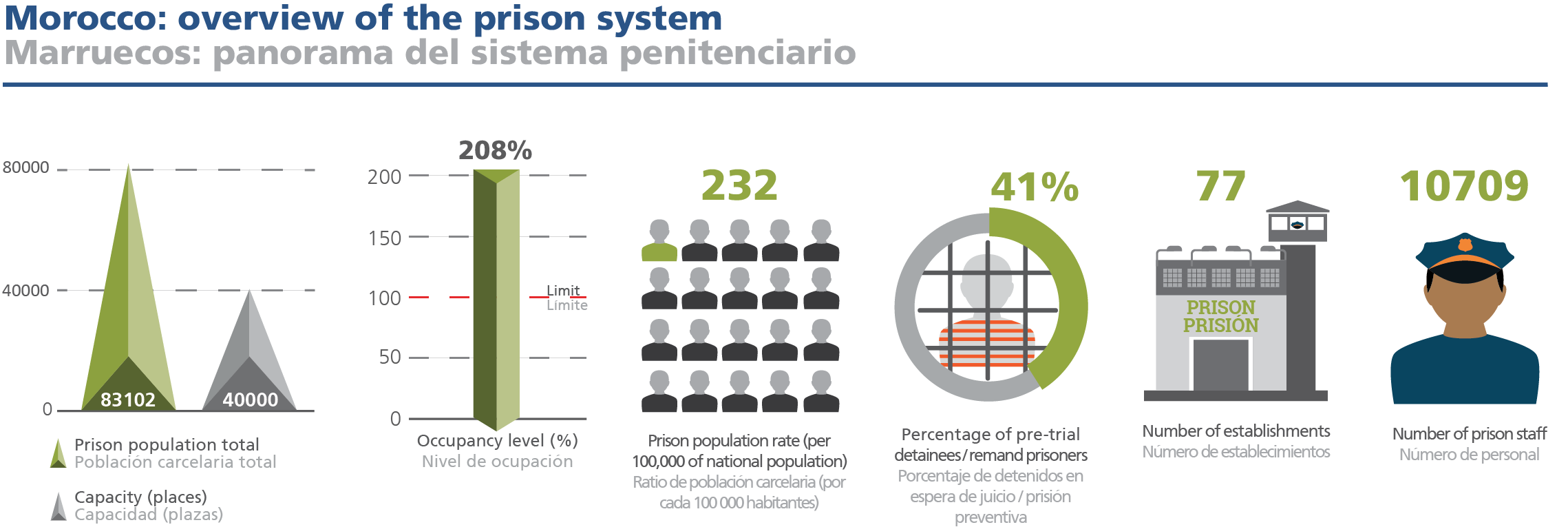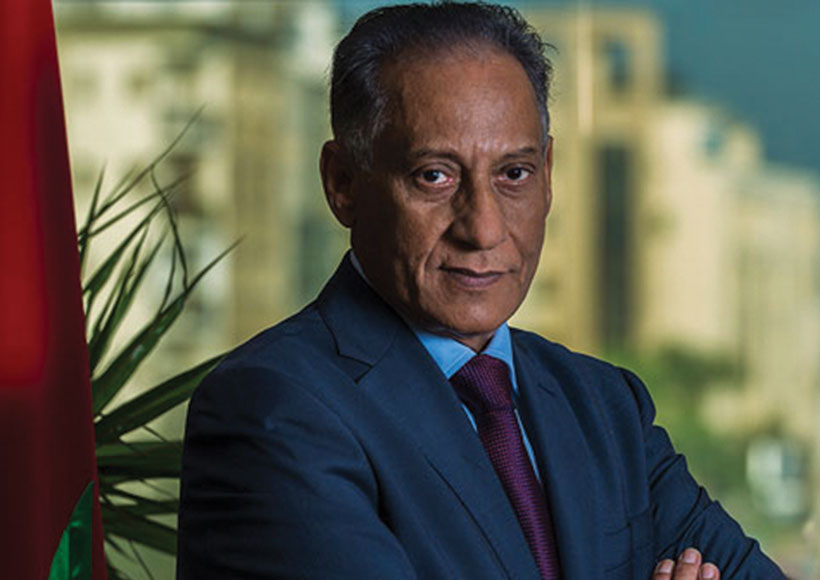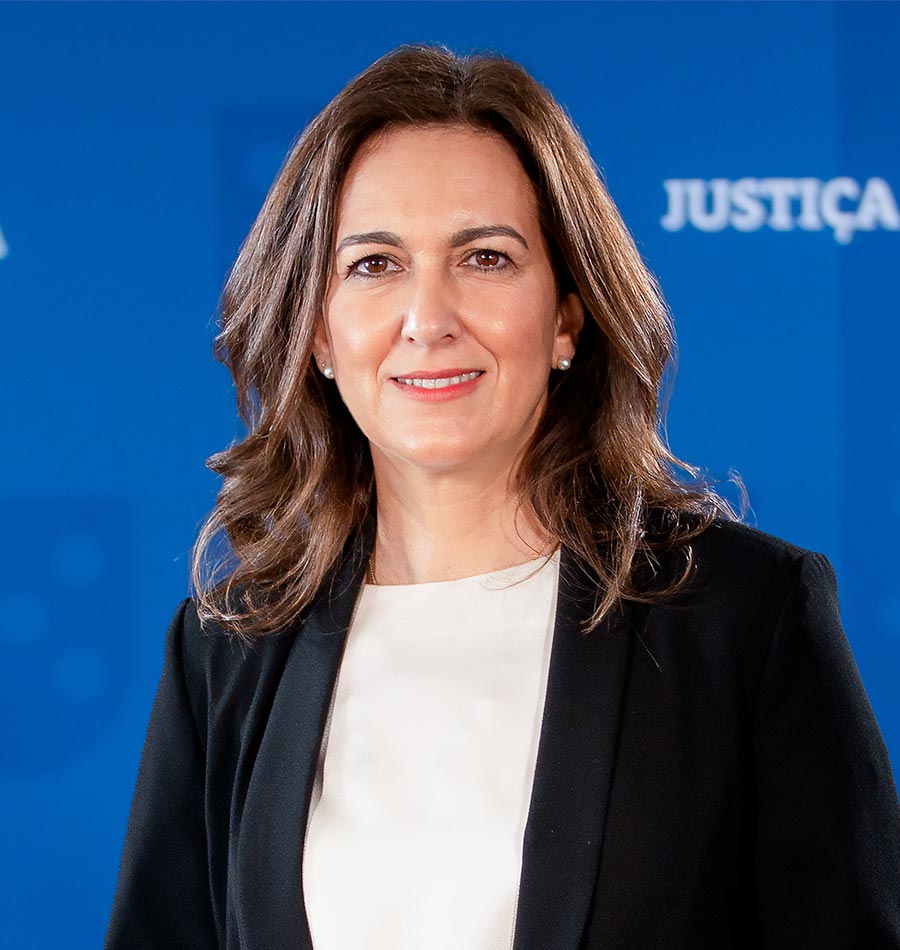// Interview: Mohamed Salah Tamek
Delegate General of the Correctional Department, Kingdom of Morocco
JT: What are the main difficulties that the Moroccan correctional system is facing and what are you doing to overcome them?
MST: The Moroccan prison population exceeded 83,000 inmates at the end of December 2017. This shows that, despite the continuous efforts towards improving the detention conditions, as well as building larger facilities, overcrowding remains a permanent major problem.
The continuous increase of the prison population is due, partly, to pre-trial detention, which leads not only to overcrowding but also has a negative impact on the services provided to offenders and on the rights they are supposed to enjoy. Such rights – which are stipulated by national and international standards – include food catering, healthcare, hygiene, and reintegration programmes. However, the Moroccan Correctional Department (DGAPR, according to the acronym in French) is faced with the inadequacy of funds allocated to the prison sector.
Besides, the management of extremist offenders constitutes a major challenge, on account of the sensitivity of this issue. Dealing with such category of offenders requires more enhanced security measures and specific reintegration programmes, more qualified staff and, thus, more budget and additional resources. We would like to improve the staff ratio with a view to overcoming the alarming increase in the prison population and satisfying our new facilities’ needs, in terms of human resources.
Therefore, in addition to providing enough staff housing (so as to facilitate staff work in the vicinity of the correctional facilities), staff’s material conditions need to be improved as well.
In addition, drug smuggling is one of the biggest problems facing corrections. In this regard, we have been making considerable efforts to fight against this problem, mainly by the acquisition of technological control equipment which allows the detection of various deceitful means of infiltrating drugs via visitation or thrown from outside prison fences, during offenders’ recreation.
We are aware that a number of staff members are involved in drug smuggling inside prisons; they are suspended, sued and even laid off from the public sector. Further measures include staff training, the enhancement of our central complaint system and the set-up of a section on the DGAPR’s website devoted to staff housing.

JT: In your opinion, what could solve the high rate of incarceration and pre-trial detention and, therefore, alleviate the overcrowding issue?
MST: The DGAPR is making considerable efforts to provide offenders with accommodation that respects their human dignity and the rights, which are guaranteed to them by law, in accordance with the minimum rules for the treatment of offenders. However, these efforts are hampered by overcrowding due to the increase in the number of remand prisoners, which account for almost 40% of the total prison population. In 2017, we have opened three local prisons and completed extension works in another one, but overcrowding persists.
In my opinion, there are three fundamental measures that need to be undertaken so as to address overcrowding: increase prisons’ housing capacity by building new facilities with enough space, increase staff ratio and rationalise pre-trial detention by the judiciary.
To implement this programme, the DGAPR depends on the funds allocated to it annually through the investment budget. However, the lack of funding hinders construction projects within the planned deadlines. Therefore, we rely on the implementation of the framework agreement signed with the Ministry of Economy and Finance aimed at funding the construction of new correctional facilities to replace old ones located in urban areas.
The DGAPR has thus drawn up a new draft agreement at the Land and Property Rights Directorate, aimed at determining the annual programming of sums that the Ministry should transfer to the DGAPR in exchange for the abandoned real estate. The purpose is to be able to finance the construction projects of 36 new penitentiaries until 2021.
We are fully committed to the modernisation of the administration through the implementation of an integrated information system in prisons.
JT: More than 100 million dirhams (around 9 million euro) have been allocated to new video surveillance systems in several prisons (Source: Morocco World News, 03/2017). What is the status of the use of technologies in the correctional system?
MST: Securing correctional facilities requires specific sophisticated equipment, as well as new technologies, in order to reduce the infiltration of illicit products, and to manage all sorts of potential crises, such as assaults, escape attempts, or riots. In this regard, in 2017 we have acquired 48 scanners and 56 metal detection portals.
We have also set up an electronic surveillance system in twenty correctional facilities (a system that is based on smart cameras connected to a control room at our headquarters). Owing to that system, the number of recorded drug seizures amounted to 836 cases in 2017, and the number of mobile phones that were seized reached 5891 in the same year.
For the time being, nine correctional facilities had their video surveillance system upgraded, and forty-eight other have been equipped with such a system.
JT: What other improvements have been made to the system?
MST: The DGAPR aims at raising the level of health services in prisons and provide offenders with a healthcare similar to which is provided in the community. To meet these objectives, we have recruited more medical and paramedical staff (reaching 699 professionals in 2017), increasing the frame rate per inmate. Thanks to that 99.96% of the prison population receive healthcare in general medicine and dental treatments.
We work in collaboration with various national and international partners in the health sector, so as to consolidate what has been achieved and to promote programmes relating to offenders’ medical care.
All inmates have access to care either upon request, or at the initiative of the nurse who may notice a deterioration of the general health or any suspicious symptoms in an inmate, or at the doctor’s initiative, based on the original medical record.

According to whether or not they have been examined by the prison’s general doctor, offenders are referred to specialised physicians contracted with the DGAPR or to the nearest hospital. Additional examinations are conducted at the hospital, and, in emergencies, patients are directly sent to the hospital.
In case of assault, battery or marks on the body, a medical finding certificate is drawn up and sent to the Prosecutor. If during the medical examination of entrants the psychologist detects a specific profile, they are referred to a psychiatric or psychological treatment after visiting the general doctor. Medicines, explorations (blood test, CT scan, MRI, etc.), supplementary examinations, etc. are entirely at the expense of the DGAPR.
Each correctional facility has a stock of medicine necessary for the treatment of all known pathologies. Moreover, throughout the year 2017, offenders have benefited from awareness campaigns in the field of healthcare, namely regarding tuberculosis, AIDS, cancer, and addictions.
Another improvement was food catering.
In 2017, following the concession of food catering to private companies in all prisons, the focus was on modernisation, to allow offenders to take complete meals in good conditions without food baskets brought by their relatives. In this regard, it was decided to ban these baskets permanently in all prisons from October 2017, regardless of religious occasions, given the security problems they posed. In addition, the basket is a heavy burden for the families of offenders, especially those in need.
We have improved the offenders’ dietary plans so that they have meals in accordance with the provisions of relevant international health and standards charters; hence, food quantity and quality have been adjusted and new food products such as seasonal fruits, yoghurts, and fish have been added to the diet. A special diet was introduced for offenders suffering from diseases that require it, as well as for children accompanying their mothers in prison, in addition to a special programme for religious occasions and holidays, including the holy month of Ramadan.
Further measures were aimed at maintaining the general conditions of hygiene in correctional facilities (equipment, crockery, and people assigned to kitchens, etc.) while adopting necessary measures at the level of control and monitoring, through continuous inspections and monitoring. In order to guarantee the supply of healthy and good quality food products, we work in continuous coordination with the local services to fight against fraud as well as with the services assigned to the National Office of the Sanitary Security of Food Products.
In addition, we are fully committed to the modernisation of the administration through the implementation of an integrated information system in several prisons, with a view to generalise it to all prisons during the ongoing year. Another modernisation project was launched with a view to improving family visits, as well as the launch of the National Complaints Portal project, in accordance with the provisions of the Royal Speech of 14 October 2016, regarding the reception and processing of offenders’ complaints.
Further recent improvements and initiatives aiming at reintegration range from Spring Universities to “Cultural cafés” (nationally renowned cultural figures join offenders in prison for interactive talks with offenders). With a view to promoting craftsmanship, we initiated a programme called “Forsa wa Ibdaa” (Opportunity and Creativity) in 2017 in which offenders are given vocational training and skills.
Another programme is called “Self-managed” which aims at supporting offenders create their own small/medium-sized businesses; this is in partnership with the National Agency for the promotion of SMEs.
In order to allow offenders to discover the outside world and help them seize their leisure and free time, we are soon to be releasing a correctional radio station called “Radio Idmaj” (Reinsertion Radio) in the Prison of Casablanca for male, female and juvenile offenders, pending its generalisation to all correctional facilities.
Finally, we offer inmates the opportunity to develop their skills and refine their artistic talent, by strengthening confidence in their ability to reconcile with society after their release. Hence, our Department published a trilingual book entitled “cARTceral: Reintegration through Creativity”, which represents a collection of works developed by offenders serving their prison terms in the different correctional facilities of the Kingdom.
So, I can only express my joy about our achievements, despite the daily difficulties we’re confronted with. There is also no doubt that we are working in a modern, efficient and transparent way.
Overcrowding persists (…) The purpose is to be able to finance the construction of 36 new penitentiaries until 2021.
JT: The Kingdom of Morocco is working with regional partners to combat violent extremism at the political, economic and security levels.
The country has been committed to deepening cooperation with neighbouring countries, the King has expressed support for joint efforts to combat radicalisation, and authorities from other African countries indicated a willingness to train their imams in Morocco. (Source: Washington Institute, 05/2014).
What is being done from the Correctional Department at the level of counter-terrorism, and what role do these efforts play in the counter-terrorism landscape in the region?
MST: Throughout 2017, we took part in numerous events related to the topic of terrorism and violent radicalisation, namely: A joint workshop on the Working Tools Initiative on the session on extremism and violence in the framework of the Global Forum on Terrorism; a Roundtable, in Tunis, comprising ministerial and academic representatives from Morocco, Lebanon and Tunisia in the framework of the regional project “Promotion of flexibility” organised by the British Council; a workshop during which the Moroccan experience and that of African countries in the field of training in prisons were shared in the framework of the cooperation between the Correctional Department and the International Office for the Fight against Narcotic Drugs and Safe cooperation; and a Roundtable on “Religious Learning and Rejection of Hate and Incitement to Violence and Pride-Based Dialogue in Prisons”, in partnership with the Penal Reform Organisation.
At the security level, we have been taken all necessary actions to protect “regular offenders” from any negative impact from extremist ones. To this end, we have developed a correctional intelligence-based approach and a specific classification system, through a risk and needs assessment process.
Extremist offenders are thus classified in three categories to ensure complete or partial isolation and efficient supervision: Category 1 includes the “indoctrinators”, instigators, leaders and the indoctrinated (housed in individual cells); the “hard-liners” and suppliers of material support.
Category 2 consists of introverted extremist offenders and those with psychological vulnerabilities as well as the ideological review offenders and Royal pardon/amnesty requests offenders. Category 3: compliant offenders (under supervision).
We have implemented the “Moussalaha” (reconciliation) programme on behalf of extremist offenders aiming at enabling them to come to terms with themselves, with society and with religious texts.
In partnership with the Mohammadan League of Religious Scholars, we have drawn up a peer-education programme aimed at enhancing the discourse of tolerance among the prison community, through workshops intended to build the capacities and skills of correctional staff. Other objectives include training prison staff to better understand, analyse and prevent radicalisation behaviours, discourses and attitudes.
On the other hand, in collaboration with the Mohammedi League of Ulemas (Islamic scholars), the National Council of Human Rights and relevant experts, we have implemented the “Mussalaha” (reconciliation) programme on behalf of extremist offenders. It aims at enabling those offenders to come to terms with themselves, with society and with religious texts. In its first edition (May-July 2017), it benefited twenty-five offenders who expressed their will to participate in it. Fourteen of them have been granted Royal Pardon.
Furthermore, the Kingdom’s strategy to combat violent extremism is directed towards human and economic development as well as the control of the religious sphere and discourse.
The Kingdom has adopted a de-radicalisation strategy aimed at promoting the Sunni Maliki-Achaari rite, and through bilateral agreements ensuring the training of 50,000 Imams from Africa (Mali, Ivory Coast, Guinea, Tunisia, and Chad) and Europe (France) by the Mohammedi League of Ulemas at Mohammed VI Imams Training Institute. In addition to that, His Majesty, King Mohammed VI, created the High Council of African Ulemas to promote a moderate Islam in Europe.
Morocco is a “stable security exporter” partner in North Africa and the only African country to contribute with its military assets in the fight against Daesh in Syria and Iraq, providing training for Chadians, Ivorians, Malians and Senegalese, not to mention the participation of Morocco in various military maneuvers such as Phoenix Express, Flintlock, Mantlet, African Lion, and Maghreb Mantlet.

JT: Having been a (political) prisoner yourself back in the 1970’s, you have experienced the deprivation of liberty in the Moroccan prison system.
To what extent does this experience help you having a different look to the Moroccan correctional system and managing it in the present?
MST: To be sincere, I don’t think my period in jail helped in any way in dealing with the responsibility as a correction manager, at least directly. In fact, my other jobs helped most in handling the present one.
Teaching – which I still consider as my real vocation – my experience in a security department such as the Ministry of Interior and also diplomacy seem to have forged my personality. His Majesty King Mohammed VI, as far as I know, is one of the very few heads of states in the world to make personal visits to correctional facilities.
This emphasises the high interest he takes in the humanisation of detention conditions. My deep and sincere belief in respect of human dignity and my conviction about the universality of human rights did the rest.
JT: How do you think the Moroccan Correctional Department will be in the future?
MST: Over four years have elapsed during which the Moroccan Correctional Department knew important evolutions and qualitative reforms to upgrade and modernise the sector. However, overcrowding remains the most serious problem we’re faced with.
The management of the penitentiary sector requires special effort and a constant mobilisation of human resources, and I can only be proud of the results achieved so far. All of this predicts the success of the adopted reform policies.
The various initiatives launched so far reflect our strong will to move forward in the implementation of these policies. Indeed, among the most important initiatives is the programme “Mousalaha” targeting offenders convicted of extremism and terrorism, and the programme “Prisons without Illiteracy” added to which the programme “Kifayat” (skills) providing offenders with skills that positively influence their behaviour.
These achievements are the result of partnerships at the national level and of the continuous communication with international partners. Hence, visits are intended to take advantage of experiences and to learn about the best practices in prison management.
//
Mr. Mohamed Salah Tamek started his career as a research professor in 1986, then, between 1998 and 2003, he served as Governor of the province of Chichaoua, subsequent to which he was appointed as His Majesty’s Ambassador of Norway and Finland. In 2005, Mr. Tamek was made Wali of the region of Oued Ed-Dahab Lagouira and Governor of Oued Ed-Dahab Province. By 2010 he held the position of Wali and of the Minister of Interior’s Chief of Staff. In January 2014, he was appointed as Delegate General of the Correctional Department. In the framework of human rights promotion, he has participated in several missions to the UN, the European Parliament, and several European governments. He holds a Ph.D. in discourse analysis in English and is fluent in several languages. Mr. Tamek was bestowed with the Order of Ouissam Alawite as Knight.


